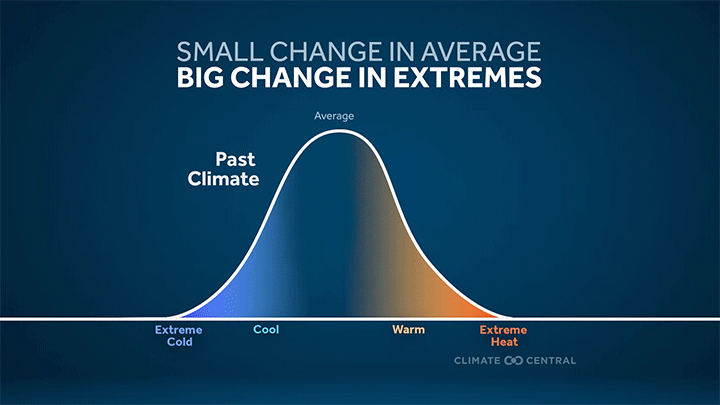 Just Have A Think | The money men know the truth about
planetary boundaries! (16+ min)
money_men.webm
Institute and Faculty of Actuaries | The Emperor's New Climate
Scenarios - Limitations and assumptions of commonly used
climate-change scenarios in financial services
https://actuaries.org.uk/media/qeydewmk/the-emperor-s-new-climate-scenarios_ifoa_23.pdf
Everyone who cares about the stability of our financial
system should read this paper. Failing to include known
non-linear effects in strategic thinking about climate
change will lead to complacency, heightened risk and missed
opportunities. So the scenarios that are used as part of
TCFD processes really matter - both because economic damage
will grow much faster and because the transition to clean
technologies will happen much faster than conventional
economic modelling suggests.
Just Have A Think | The money men know the truth about
planetary boundaries! (16+ min)
money_men.webm
Institute and Faculty of Actuaries | The Emperor's New Climate
Scenarios - Limitations and assumptions of commonly used
climate-change scenarios in financial services
https://actuaries.org.uk/media/qeydewmk/the-emperor-s-new-climate-scenarios_ifoa_23.pdf
Everyone who cares about the stability of our financial
system should read this paper. Failing to include known
non-linear effects in strategic thinking about climate
change will lead to complacency, heightened risk and missed
opportunities. So the scenarios that are used as part of
TCFD processes really matter - both because economic damage
will grow much faster and because the transition to clean
technologies will happen much faster than conventional
economic modelling suggests.
The Global Tipping Points Report
https://global-tipping-points.org
https://global-tipping-points.org/summary-report/key-messages/
https://global-tipping-points.org/summary-report/key-recommendations/
https://global-tipping-points.org/summary-report/narrative-summary/
 IRREVERSIBLE CHANGE
CLIMATE CHANGE AND NATURE LOSS COULD SOON CAUSE 'TIPPING
POINTS' IN THE NATURAL WORLD
Environmental stresses could become so severe that large
parts of the natural world are unable to maintain their
current state, leading to abrupt and/or irreversible
changes. These moments are called Earth system 'tipping
points'. Five major tipping systems are already at risk of
crossing tipping points at the present level of global
warming: the Greenland and West Antarctic ice sheets,
warm-water coral reefs, North Atlantic Subpolar Gyre
circulation, and permafrost regions.
IRREVERSIBLE CHANGE
CLIMATE CHANGE AND NATURE LOSS COULD SOON CAUSE 'TIPPING
POINTS' IN THE NATURAL WORLD
Environmental stresses could become so severe that large
parts of the natural world are unable to maintain their
current state, leading to abrupt and/or irreversible
changes. These moments are called Earth system 'tipping
points'. Five major tipping systems are already at risk of
crossing tipping points at the present level of global
warming: the Greenland and West Antarctic ice sheets,
warm-water coral reefs, North Atlantic Subpolar Gyre
circulation, and permafrost regions.
The Intergovernmental Panel on Climate Change (IPCC) is the
United Nations body for assessing the science related to
climate change.
The IPCC prepares comprehensive Assessment Reports about the
state of scientific, technical and socio-economic knowledge on
climate change, its impacts and future risks, and options for
reducing the rate at which climate change is taking place. It
also produces Special Reports on topics agreed to by its
member governments, as well as Methodology Reports that
provide guidelines for the preparation of greenhouse gas
inventories. The IPCC is working on the Sixth Assessment
Report which consists of three Working Group contributions and
a Synthesis Report. The Working Group I contribution was
finalized in August 2021, the Working Group II contribution in
February 2022 and the Working Group III contribution in April
2022.
IPCC Sixth Assessment Reports (AR6) (2021-2023)
https://www.ipcc.ch/reports/
AR6 Climate Change 2021: The Physical Science Basis
https://www.ipcc.ch/report/sixth-assessment-report-working-group-i/ <==
AR6 Climate Change 2022: Mitigation of Climate Change
https://www.ipcc.ch/report/sixth-assessment-report-working-group-3/
AR6 Climate Change 2022: Impacts, Adaptation and Vulnerability
https://www.ipcc.ch/report/sixth-assessment-report-working-group-ii/
https://www.ipcc.ch/report/ar6/wg2/downloads/report/IPCC_AR6_WGII_SummaryForPolicymakers.pdf
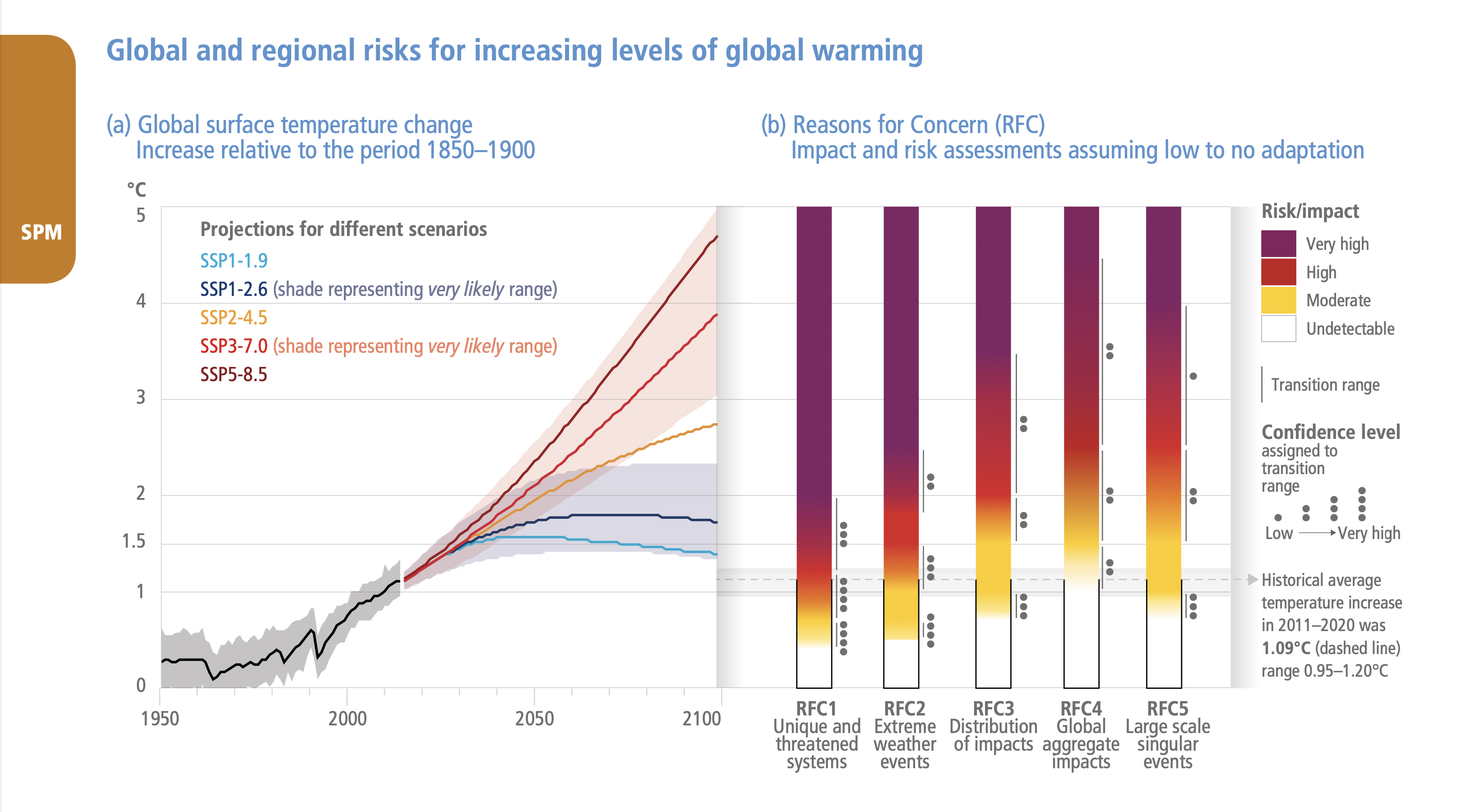 https://www.ipcc.ch/report/ar6/wg2/resources/spm-headline-statements/
Observed and Projected Impacts and Risks
Beyond 2040 and depending on the level of global warming,
climate change will lead to numerous risks to natural and
human systems (high confidence).
https://www.ipcc.ch/report/ar6/wg2/downloads/outreach/IPCC_AR6_WGII_FactSheet_NorthAmerica.pdf
AR6 Synthesis Report: Climate Change 2023
https://www.ipcc.ch/report/sixth-assessment-report-cycle/
IPCC: Climate change: a threat to human wellbeing and health
of the planet. Taking action now can secure our future
https://www.ipcc.ch/2022/02/28/pr-wgii-ar6/
BERLIN, Feb 28 - Human-induced climate change is causing
dangerous and widespread disruption in nature and affecting
the lives of billions of people around the world, despite
efforts to reduce the risks. People and ecosystems least
able to cope are being hardest hit, said scientists in the
latest Intergovernmental Panel on Climate Change (IPCC)
report, released today.
"This report is a dire warning about the consequences of
inaction," said Hoesung Lee, Chair of the IPCC. "It shows
that climate change is a grave and mounting threat to our
wellbeing and a healthy planet. Our actions today will shape
how people adapt and nature responds to increasing climate
risks."
Climate Central Graphics
https://www.climatecentral.org/resources?type=Graphic&tab=graphics
https://www.ipcc.ch/report/ar6/wg2/resources/spm-headline-statements/
Observed and Projected Impacts and Risks
Beyond 2040 and depending on the level of global warming,
climate change will lead to numerous risks to natural and
human systems (high confidence).
https://www.ipcc.ch/report/ar6/wg2/downloads/outreach/IPCC_AR6_WGII_FactSheet_NorthAmerica.pdf
AR6 Synthesis Report: Climate Change 2023
https://www.ipcc.ch/report/sixth-assessment-report-cycle/
IPCC: Climate change: a threat to human wellbeing and health
of the planet. Taking action now can secure our future
https://www.ipcc.ch/2022/02/28/pr-wgii-ar6/
BERLIN, Feb 28 - Human-induced climate change is causing
dangerous and widespread disruption in nature and affecting
the lives of billions of people around the world, despite
efforts to reduce the risks. People and ecosystems least
able to cope are being hardest hit, said scientists in the
latest Intergovernmental Panel on Climate Change (IPCC)
report, released today.
"This report is a dire warning about the consequences of
inaction," said Hoesung Lee, Chair of the IPCC. "It shows
that climate change is a grave and mounting threat to our
wellbeing and a healthy planet. Our actions today will shape
how people adapt and nature responds to increasing climate
risks."
Climate Central Graphics
https://www.climatecentral.org/resources?type=Graphic&tab=graphics
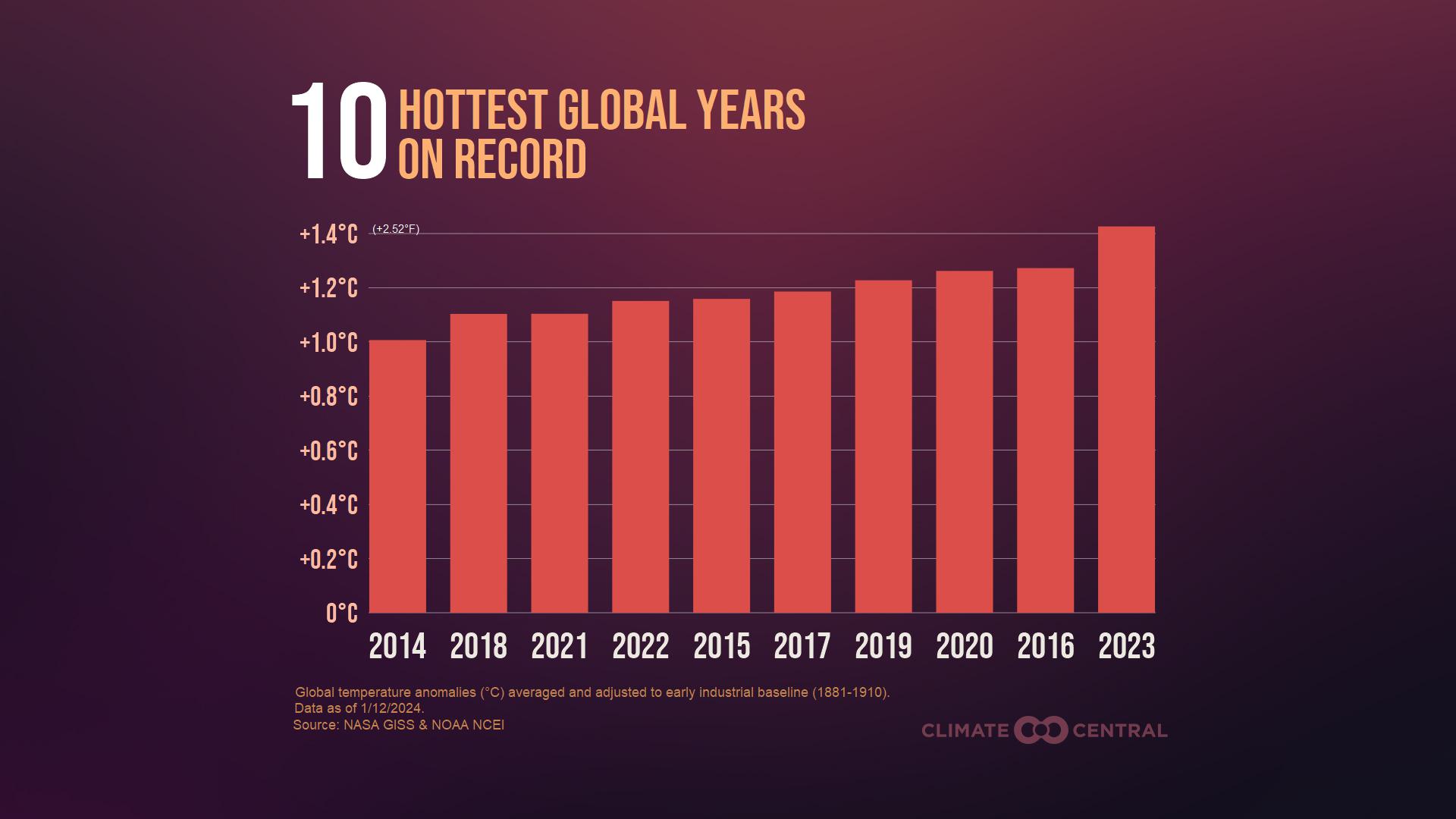
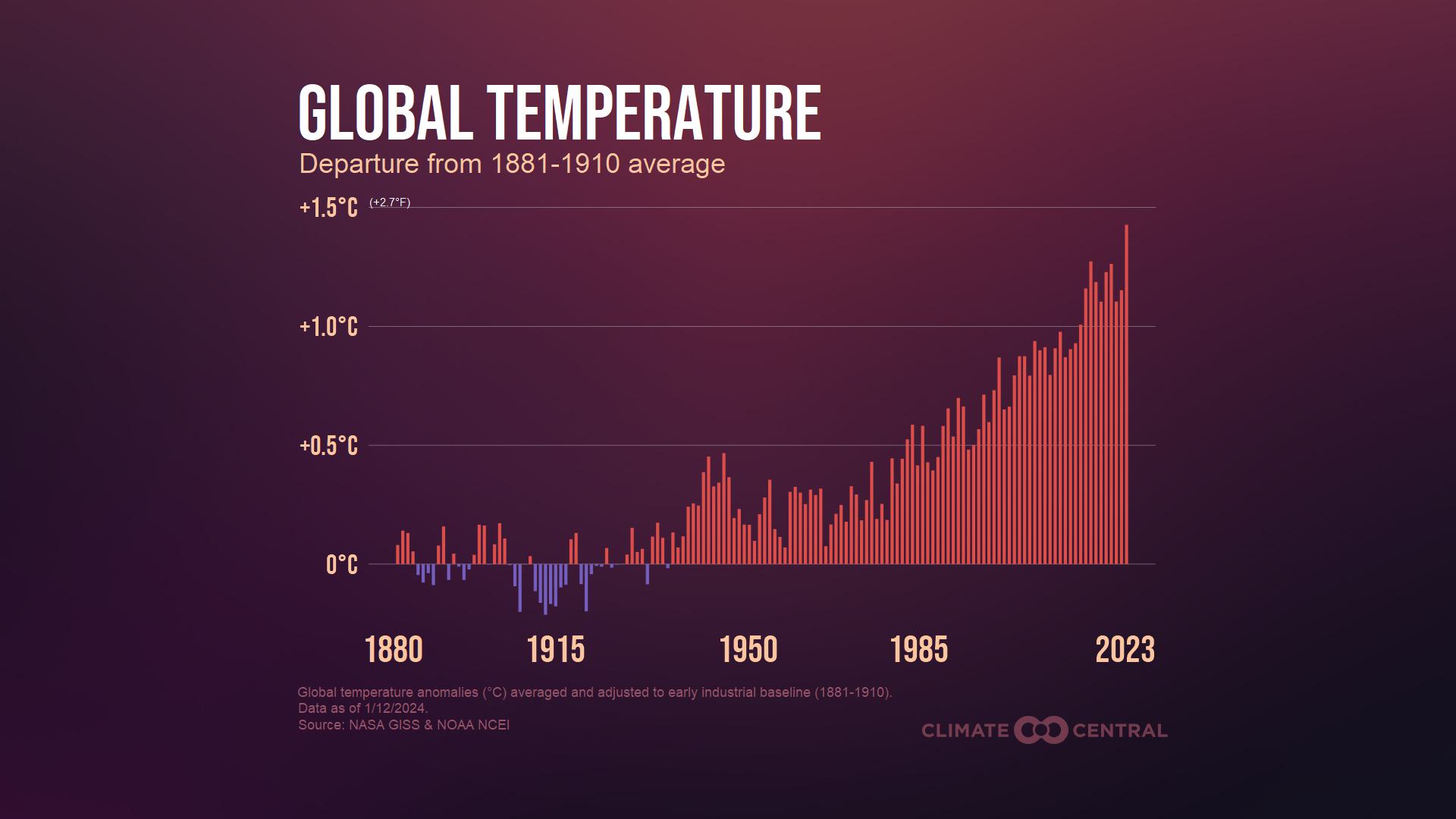
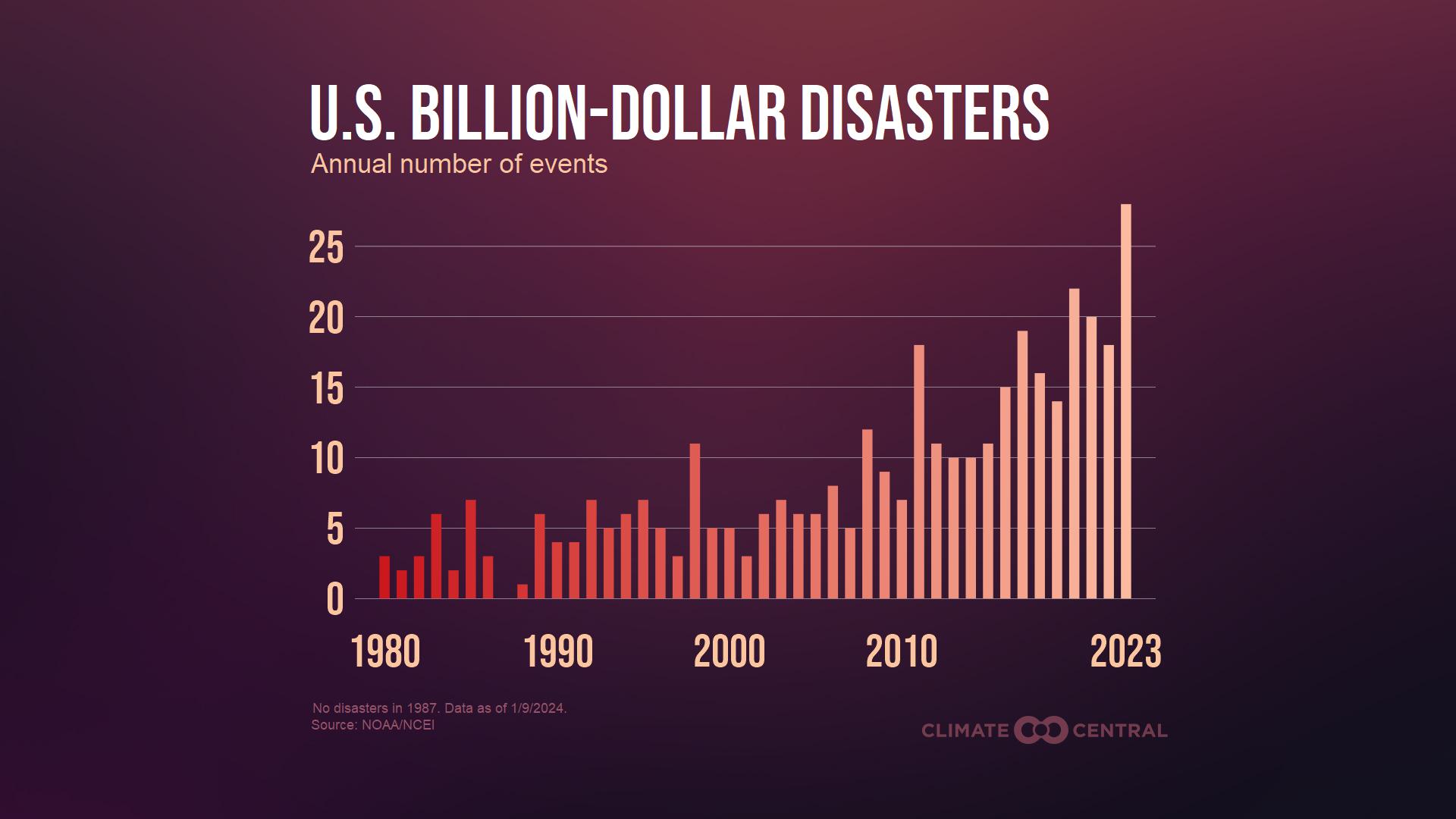
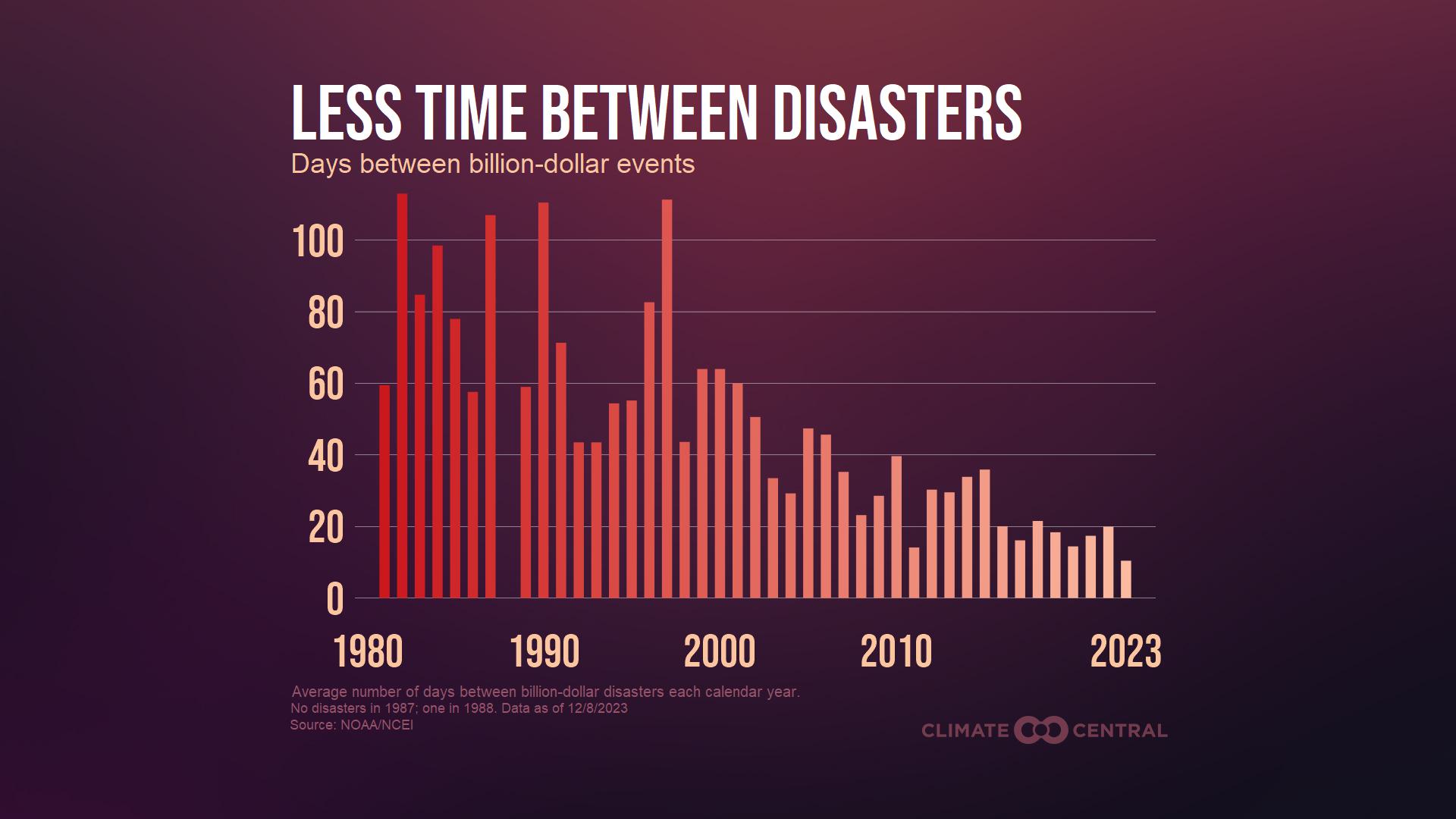 Scientists Discover Alarming Evidence Global Warning Is Accelerating
https://www.sciencealert.com/scientists-discover-alarming-evidence-global-warning-is-accelerating
Scientists Discover Alarming Evidence Global Warning Is Accelerating
https://www.sciencealert.com/scientists-discover-alarming-evidence-global-warning-is-accelerating
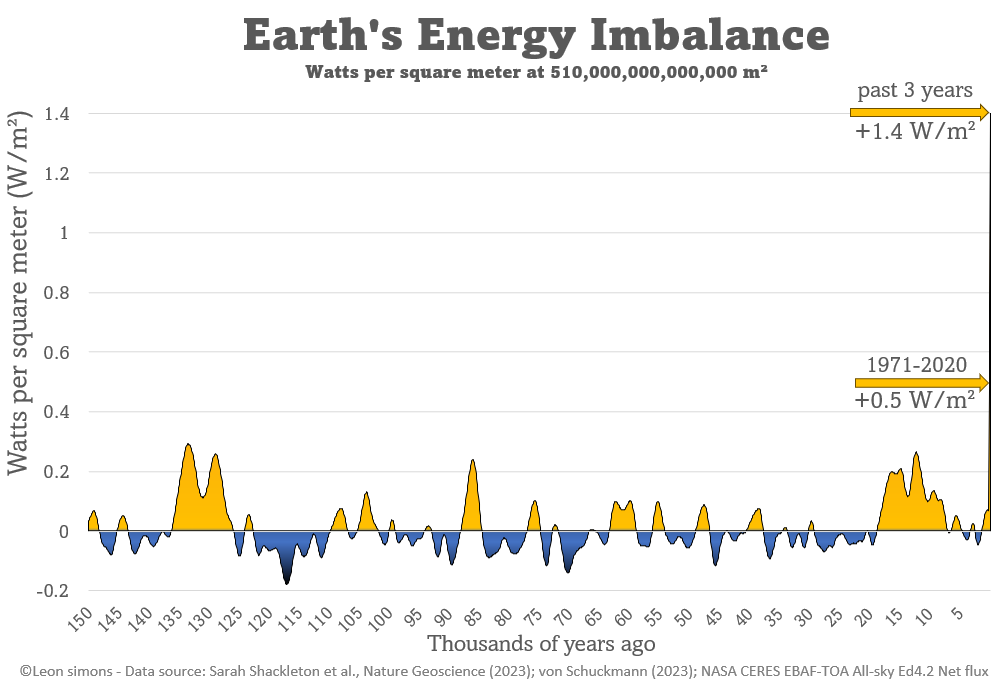 James Hansen: Groundhog Day. Another Gobsmackingly Bananas
Month. What's Up?
https://www.columbia.edu/~jeh1/mailings/2024/Groundhog.04January2024.pdf
James Hansen: Groundhog Day. Another Gobsmackingly Bananas
Month. What's Up?
https://www.columbia.edu/~jeh1/mailings/2024/Groundhog.04January2024.pdf
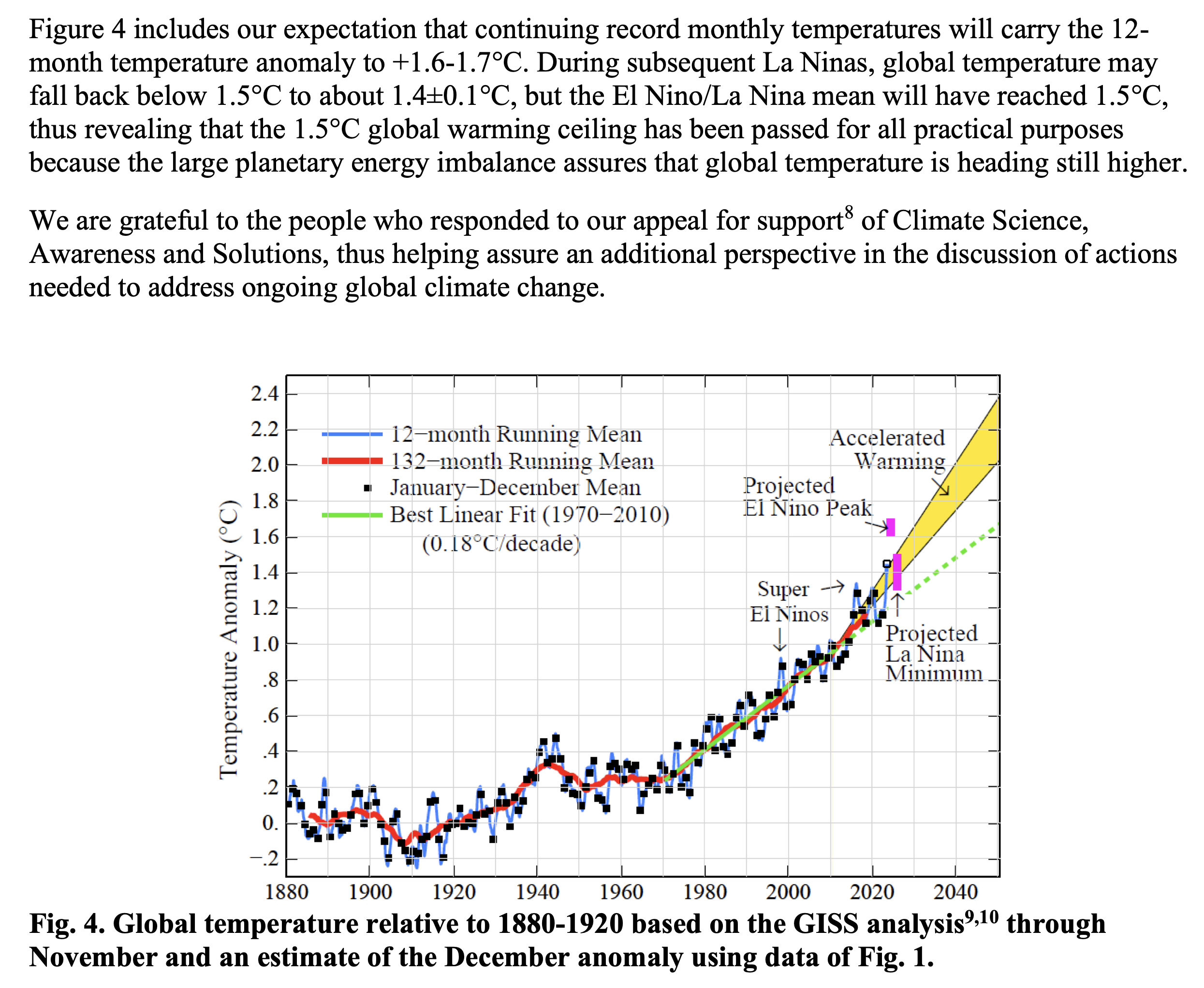
European climate risk assessment (2024)
Executive summary
EXECUTIVE_SUMMARY_European_climate_risk_assessment_TH-AL-24-001-EN-N.pdf
This assessment identifies 36 climate risks with potentially
severe consequences across Europe. The risks are evaluated
in the contexts of risk severity, policy horizon (lead time
and decision horizon), policy readiness and risk ownership.
It further identifies priorities for EU policy action, based
on a structured risk assessment united with qualitative
aspects, such as considering social justice.
Fifth National Climate Assessment (NCA5)
https://nca2023.globalchange.gov
The Fifth National Climate Assessment is the US Government?s
preeminent report on climate change impacts, risks, and
responses. It is a congressionally mandated interagency
effort that provides the scientific foundation to support
informed decision-making across the United States.
The more the planet warms, the greater the impacts. Without
rapid and deep reductions in global greenhouse gas emissions
from human activities, the risks of accelerating sea level
rise, intensifying extreme weather, and other harmful
climate impacts will continue to grow. Each additional
increment of warming is expected to lead to more damage and
greater economic losses compared to previous increments of
warming, while the risk of catastrophic or unforeseen
consequences also increases.
SOUNDING THE ALARM
Global Tipping Points
https://global-tipping-points.org
https://global-tipping-points.org/summary-report/narrative-summary/
The Climate Change We've Already Created Will Last 50,000
Years, Scientists Warn : ScienceAlert
https://www.sciencealert.com/the-climate-change-weve-already-created-will-last-50000-years-scientists-warn
'It won't go back to normal': What this year's heat waves mean
for life in the coming years
https://www.mercurynews.com/2023/08/18/it-wont-go-back-to-normal-what-this-years-heat-waves-mean-for-life-in-the-coming-years/
Whatever your views are about climate change and the source
of this warming, it is happening, and it's happening fast.
We need to get smart about the implications of living with
extreme heat because we're going to be doing it whether we
like it or not, for our own welfare and for our loved ones.
Our Fragile Earth: How Close Are We to Climate Catastrophe?
https://www.scientificamerican.com/article/our-fragile-earth-how-close-are-we-to-climate-catastrophe/
Science tells us that if we act quickly, if we act
dramatically, we can avoid warming that will bring far worse
consequences. That's the fragility of this moment: we have a
little bit of a safety margin, but it's not a large safety
margin. The phrase I use often these days, a phrase that
characterizes the message of this book, is the pairing of
urgency and agency.
Yes, it's bad, and we face far worse consequences if we
don't act. We can see devastating climate consequences
already. That's the urgency. But the paleoclimate record
tells us we haven't triggered runaway warming yet. We can
avoid that point of no return if we act quickly and
dramatically.
Ecological doom-loops: Why ecosystem collapses may occur much
sooner than expected
https://phys.org/news/2023-06-ecological-doom-loops-ecosystem-collapses-sooner.html
What really worries us is that climate extremes could hit
already stressed ecosystems, which in turn transfer new or
heightened stresses to some other ecosystem, and so on. This
means one collapsing ecosystem could have a knock-on effect
on neighboring ecosystems through successive feedback loops:
an "ecological doom-loop" scenario, with catastrophic
consequences.
There is no Plan B for dealing with the climate crisis
By Raymond T. Pierrehumbert, August 30, 2019
https://desdemonadespair.net/2019/09/there-is-no-plan-b-for-dealing-with-climate-change-with-regard-to-the-climate-crisis-yes-its-time-to-panic.html
Let's get this on the table right away, without mincing
words. With regard to the climate crisis, yes, it's time to
panic. We are in deep trouble. To understand why, it is
necessary to understand something about carbon budgets.
Some of the carbon dioxide added to the atmosphere by human
activities such as fossil fuel burning is quickly taken up
by the upper ocean and land ecosystems. Some of the rest is
slowly absorbed into the deep ocean over the next
millennium. However, a lot remains in the atmosphere, and it
is only slowly removed by geological processes that take
hundreds of thousands of years. Consequently, carbon dioxide
accumulates in the atmosphere throughout the lifetime of the
fossil-fueled economy, and it will not drop much even after
we finally kick the carbon habit and cease our carbon
dioxide emissions.
If CO2 Emissions Keep Up, Earth Is Headed Back to The Triassic
Period -- Or Worse
https://www.sciencealert.com/if-co2-emissions-keep-up-earth-is-headed-back-to-the-triassic-period-or-worse
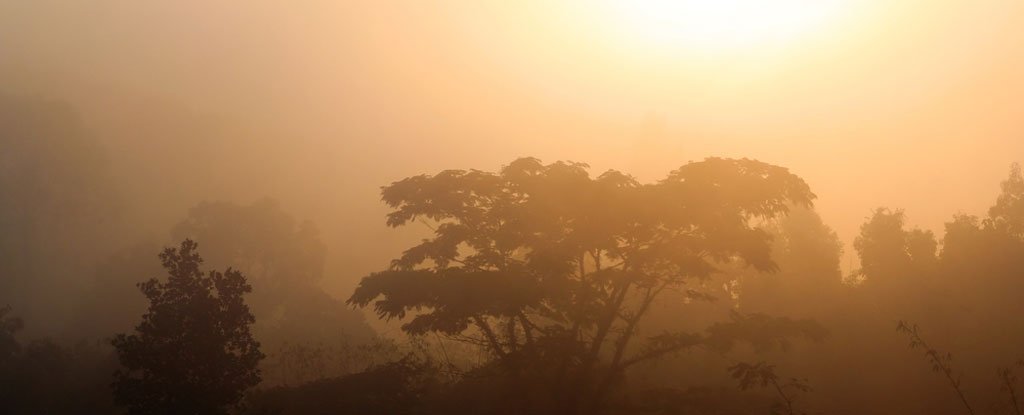 It's no secret that our planet is getting hotter due to
heat-trapping carbon dioxide (CO2) emissions, but a new
study suggests that current global warming trends could
produce a climate not seen in almost half a billion years of
Earth's history.
Worried about Earth's future? Well, the outlook is worse than
even scientists can grasp
https://phys.org/news/2021-01-earth-future-outlook-worse-scientists.html
Anyone with even a passing interest in the global
environment knows all is not well. But just how bad is the
situation? Our new paper shows the outlook for life on Earth
is more dire than is generally understood.
The research published today reviews more than 150 studies
to produce a stark summary of the state of the natural
world. We outline the likely future trends in biodiversity
decline, mass extinction, climate disruption and planetary
toxification. We clarify the gravity of the human
predicament and provide a timely snapshot of the crises that
must be addressed now.
The exorbitant cost of climate procrastination
https://phys.org/news/2019-02-exorbitant-climate-procrastination.html
A 3°C warming would wreak havoc on the planet, justifying
the absolute necessity of the +1.5°C limit. However, even
a +1.5°C change would incur heavy consequences. The
adaptation cost would undoubtedly be high both for current
and future generations: loss of agricultural yields,
sea-level rise, whole regions rendered uninhabitable,
leading to massive flows of climate migrants, collapse of
the ecosystems and impoverished biodiversity, extreme
meteorological events, seashore and topsoil erosion... All
these effects will grow even more dire as global warming
proceeds."
How climate change can make catastrophic weather systems
linger for longer
https://phys.org/news/2019-02-climate-catastrophic-weather-linger-longer.html
There does seem to be a plausible link between human-induced
warming, slowing of jet streams, blocking highs, and extreme
weather around the world. There is also a trend for the
slowing of the forward speed (as opposed to wind speed) of
tropical cyclones around the world. One recent study showed
the average forward speeds of tropical cyclones fell by 10%
worldwide between 1949 and 2016. Meanwhile, over the same
period, the forward speed of tropical cyclones dropped by
22% over land in the Australian region.
The Fall of The Amazon Could Trigger a Global Cascade of
Tipping Points
https://www.sciencealert.com/the-fall-of-the-amazon-could-trigger-a-global-cascade-of-tipping-points
If the Amazon crosses a critical threshold of
self-resilience, a new study suggests the disaster could set
off a domino effect, knocking over tipping points elsewhere
in the world, too, abruptly accelerating environmental
crises and causing irreparable damage to the planet.
Tipping points in the global climate system, such as
collapsing ice sheets, glacier melt, forest dieback, sea
level rise, and shifting monsoons, have received a lot more
attention in recent years.
Each one of these switches could seriously turn up the heat
on our planet, creating a 'hothouse Earth' with irreversible
and catastrophic effects.
They are all connected by the global greenhouse effect, but
in a climate crisis, it's uncertain in what order they will
ultimately fall.
It's no secret that our planet is getting hotter due to
heat-trapping carbon dioxide (CO2) emissions, but a new
study suggests that current global warming trends could
produce a climate not seen in almost half a billion years of
Earth's history.
Worried about Earth's future? Well, the outlook is worse than
even scientists can grasp
https://phys.org/news/2021-01-earth-future-outlook-worse-scientists.html
Anyone with even a passing interest in the global
environment knows all is not well. But just how bad is the
situation? Our new paper shows the outlook for life on Earth
is more dire than is generally understood.
The research published today reviews more than 150 studies
to produce a stark summary of the state of the natural
world. We outline the likely future trends in biodiversity
decline, mass extinction, climate disruption and planetary
toxification. We clarify the gravity of the human
predicament and provide a timely snapshot of the crises that
must be addressed now.
The exorbitant cost of climate procrastination
https://phys.org/news/2019-02-exorbitant-climate-procrastination.html
A 3°C warming would wreak havoc on the planet, justifying
the absolute necessity of the +1.5°C limit. However, even
a +1.5°C change would incur heavy consequences. The
adaptation cost would undoubtedly be high both for current
and future generations: loss of agricultural yields,
sea-level rise, whole regions rendered uninhabitable,
leading to massive flows of climate migrants, collapse of
the ecosystems and impoverished biodiversity, extreme
meteorological events, seashore and topsoil erosion... All
these effects will grow even more dire as global warming
proceeds."
How climate change can make catastrophic weather systems
linger for longer
https://phys.org/news/2019-02-climate-catastrophic-weather-linger-longer.html
There does seem to be a plausible link between human-induced
warming, slowing of jet streams, blocking highs, and extreme
weather around the world. There is also a trend for the
slowing of the forward speed (as opposed to wind speed) of
tropical cyclones around the world. One recent study showed
the average forward speeds of tropical cyclones fell by 10%
worldwide between 1949 and 2016. Meanwhile, over the same
period, the forward speed of tropical cyclones dropped by
22% over land in the Australian region.
The Fall of The Amazon Could Trigger a Global Cascade of
Tipping Points
https://www.sciencealert.com/the-fall-of-the-amazon-could-trigger-a-global-cascade-of-tipping-points
If the Amazon crosses a critical threshold of
self-resilience, a new study suggests the disaster could set
off a domino effect, knocking over tipping points elsewhere
in the world, too, abruptly accelerating environmental
crises and causing irreparable damage to the planet.
Tipping points in the global climate system, such as
collapsing ice sheets, glacier melt, forest dieback, sea
level rise, and shifting monsoons, have received a lot more
attention in recent years.
Each one of these switches could seriously turn up the heat
on our planet, creating a 'hothouse Earth' with irreversible
and catastrophic effects.
They are all connected by the global greenhouse effect, but
in a climate crisis, it's uncertain in what order they will
ultimately fall.
ISU professor of Geological and Atmospheric Sciences
Bill Gutowski - Global Climate Change 101
https://isualumblog.wordpress.com/2015/08/20/global-climate-change-101/
ISU professor of Geological and Atmospheric Sciences
Eugene S. Takle (ISU) | Outreach Presentations
https://meteor.geol.iastate.edu/faculty/takle/index.html
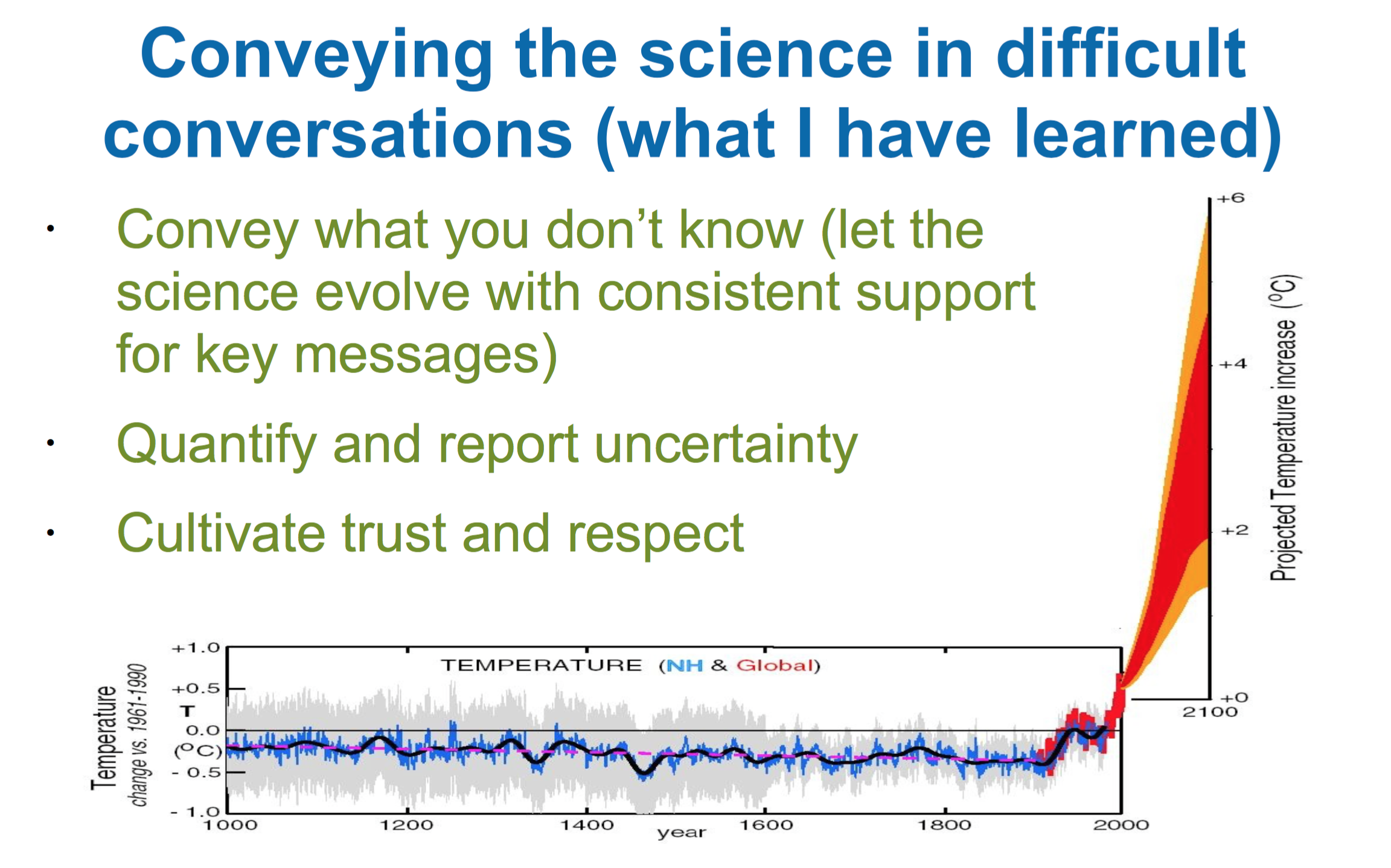 sam.wormley@icloud.com
sam.wormley@icloud.com
Just Have A Think | The money men know the truth about planetary boundaries! (16+ min) money_men.webm Institute and Faculty of Actuaries | The Emperor's New Climate Scenarios - Limitations and assumptions of commonly used climate-change scenarios in financial services https://actuaries.org.uk/media/qeydewmk/the-emperor-s-new-climate-scenarios_ifoa_23.pdf Everyone who cares about the stability of our financial system should read this paper. Failing to include known non-linear effects in strategic thinking about climate change will lead to complacency, heightened risk and missed opportunities. So the scenarios that are used as part of TCFD processes really matter - both because economic damage will grow much faster and because the transition to clean technologies will happen much faster than conventional economic modelling suggests.
IRREVERSIBLE CHANGE CLIMATE CHANGE AND NATURE LOSS COULD SOON CAUSE 'TIPPING POINTS' IN THE NATURAL WORLD Environmental stresses could become so severe that large parts of the natural world are unable to maintain their current state, leading to abrupt and/or irreversible changes. These moments are called Earth system 'tipping points'. Five major tipping systems are already at risk of crossing tipping points at the present level of global warming: the Greenland and West Antarctic ice sheets, warm-water coral reefs, North Atlantic Subpolar Gyre circulation, and permafrost regions.
https://www.ipcc.ch/report/ar6/wg2/resources/spm-headline-statements/ Observed and Projected Impacts and Risks Beyond 2040 and depending on the level of global warming, climate change will lead to numerous risks to natural and human systems (high confidence). https://www.ipcc.ch/report/ar6/wg2/downloads/outreach/IPCC_AR6_WGII_FactSheet_NorthAmerica.pdf AR6 Synthesis Report: Climate Change 2023 https://www.ipcc.ch/report/sixth-assessment-report-cycle/ IPCC: Climate change: a threat to human wellbeing and health of the planet. Taking action now can secure our future https://www.ipcc.ch/2022/02/28/pr-wgii-ar6/ BERLIN, Feb 28 - Human-induced climate change is causing dangerous and widespread disruption in nature and affecting the lives of billions of people around the world, despite efforts to reduce the risks. People and ecosystems least able to cope are being hardest hit, said scientists in the latest Intergovernmental Panel on Climate Change (IPCC) report, released today. "This report is a dire warning about the consequences of inaction," said Hoesung Lee, Chair of the IPCC. "It shows that climate change is a grave and mounting threat to our wellbeing and a healthy planet. Our actions today will shape how people adapt and nature responds to increasing climate risks." Climate Central Graphics https://www.climatecentral.org/resources?type=Graphic&tab=graphics



Scientists Discover Alarming Evidence Global Warning Is Accelerating https://www.sciencealert.com/scientists-discover-alarming-evidence-global-warning-is-accelerating
James Hansen: Groundhog Day. Another Gobsmackingly Bananas Month. What's Up? https://www.columbia.edu/~jeh1/mailings/2024/Groundhog.04January2024.pdf

It's no secret that our planet is getting hotter due to heat-trapping carbon dioxide (CO2) emissions, but a new study suggests that current global warming trends could produce a climate not seen in almost half a billion years of Earth's history. Worried about Earth's future? Well, the outlook is worse than even scientists can grasp https://phys.org/news/2021-01-earth-future-outlook-worse-scientists.html Anyone with even a passing interest in the global environment knows all is not well. But just how bad is the situation? Our new paper shows the outlook for life on Earth is more dire than is generally understood. The research published today reviews more than 150 studies to produce a stark summary of the state of the natural world. We outline the likely future trends in biodiversity decline, mass extinction, climate disruption and planetary toxification. We clarify the gravity of the human predicament and provide a timely snapshot of the crises that must be addressed now. The exorbitant cost of climate procrastination https://phys.org/news/2019-02-exorbitant-climate-procrastination.html A 3°C warming would wreak havoc on the planet, justifying the absolute necessity of the +1.5°C limit. However, even a +1.5°C change would incur heavy consequences. The adaptation cost would undoubtedly be high both for current and future generations: loss of agricultural yields, sea-level rise, whole regions rendered uninhabitable, leading to massive flows of climate migrants, collapse of the ecosystems and impoverished biodiversity, extreme meteorological events, seashore and topsoil erosion... All these effects will grow even more dire as global warming proceeds." How climate change can make catastrophic weather systems linger for longer https://phys.org/news/2019-02-climate-catastrophic-weather-linger-longer.html There does seem to be a plausible link between human-induced warming, slowing of jet streams, blocking highs, and extreme weather around the world. There is also a trend for the slowing of the forward speed (as opposed to wind speed) of tropical cyclones around the world. One recent study showed the average forward speeds of tropical cyclones fell by 10% worldwide between 1949 and 2016. Meanwhile, over the same period, the forward speed of tropical cyclones dropped by 22% over land in the Australian region. The Fall of The Amazon Could Trigger a Global Cascade of Tipping Points https://www.sciencealert.com/the-fall-of-the-amazon-could-trigger-a-global-cascade-of-tipping-points If the Amazon crosses a critical threshold of self-resilience, a new study suggests the disaster could set off a domino effect, knocking over tipping points elsewhere in the world, too, abruptly accelerating environmental crises and causing irreparable damage to the planet. Tipping points in the global climate system, such as collapsing ice sheets, glacier melt, forest dieback, sea level rise, and shifting monsoons, have received a lot more attention in recent years. Each one of these switches could seriously turn up the heat on our planet, creating a 'hothouse Earth' with irreversible and catastrophic effects. They are all connected by the global greenhouse effect, but in a climate crisis, it's uncertain in what order they will ultimately fall.
sam.wormley@icloud.com